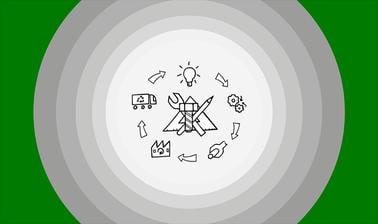MOOC List is learner-supported. When you buy through links on our site, we may earn an affiliate commission.

MOOC List is learner-supported. When you buy through links on our site, we may earn an affiliate commission.
The design of products is an important aspect of a circular economy. The circular economy approach addresses material supply challenges by keeping materials in use much longer and eventually returning materials for new use. The principle is that waste must be minimized. Products will be designed to last longer. They will be easier to Reuse, Repair, and Remanufacture. The product will eventually be broken down and Recycled. This is Design for R and is the focus of this course.
Experts from leading European universities and research organizations will explain the latest strategies in product design. Current design approaches lead to waste, loss of value and loss of resources. You will learn about the innovative ways in which companies are creating value, whilst securing their supply chains, by integrating Design for R.
This course is suitable for all learners who have an interest in product design, innovative engineering, new business activity, entrepreneurship, sustainability, circular economy and everyone who thinks that the current way we do things today needs a radical rethink.
This course is part of the Sustainable Engineering Design Professional Certificate.
What you'll learn
- Learn “ Design for R ” strategies: reuse, repair, remanufacturing, and recycling.
- Integrate life-cycle design into your skillset and your company vision.
- Understand the strategic importance of raw material supply and conservation.
- Effectively balance value creation with industrial sustainability.
- Improve your strategic design skills to make better decisions.
Prerequisites
Intended for design and engineering students and professionals. This course is aimed at students and working professionals with a basic background knowledge of design, engineering, and Circular Economy. If you want to learn the basics of Design for a Circular Economy we invite you to take a look at Circular Economy: An introduction before the start of this course. Previous knowledge of Circular Economy concepts is preferred but not necessary.
Syllabus
Week 1. Introduction: The materials challenge and the importance of product design for a Circular Economy. Focus on economic and social drivers and barriers to change.
Week 2. Design for Reuse: Towards the production of long-lasting products with reliable performance and minimum maintenance requirements. Product use intensification in the Sharing Economy.
Week 3. Design for Repair: Allows quick and efficient access to key components and connections. Making products fit for use again in a time- and resource-effective way.
Week 4. Design for Remanufacture: Re-manufactured products should look and perform as new. This implies a complex new system of reverse logistics, cleaning and conditioning facilities, as well as a shift in client and consumer mentality.
Week 5. Design for Recycle: Eventually most products will be broken down into individual materials. Choices such as the use of composites or chemical connections affects the recyclability and economic value of materials.
Week 6. Conclusion: Thinking in loops. Creating sustainable value through strategic product and business design for a Circular Economy.
MOOC List is learner-supported. When you buy through links on our site, we may earn an affiliate commission.
MOOC List is learner-supported. When you buy through links on our site, we may earn an affiliate commission.
